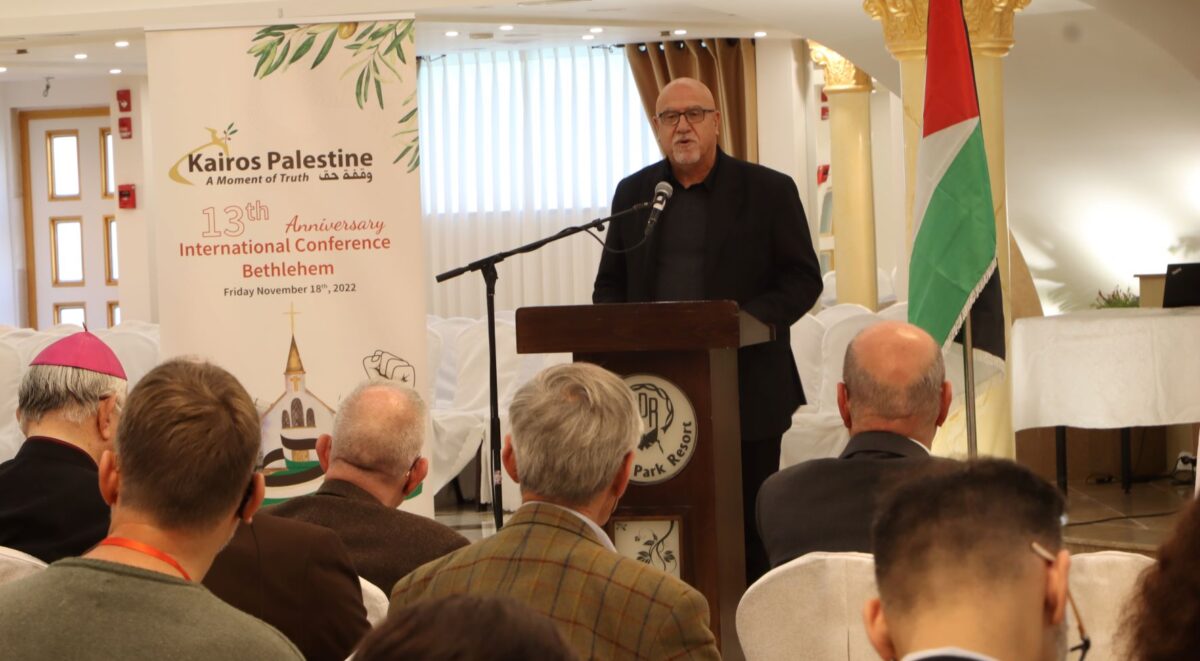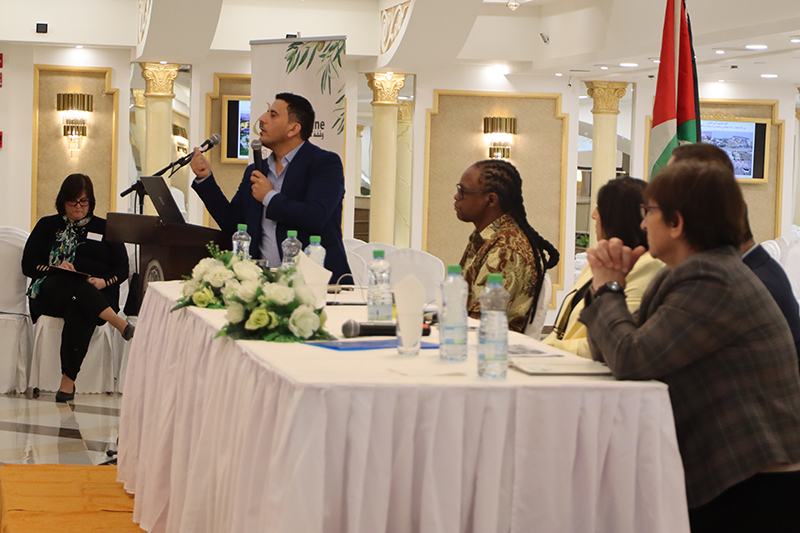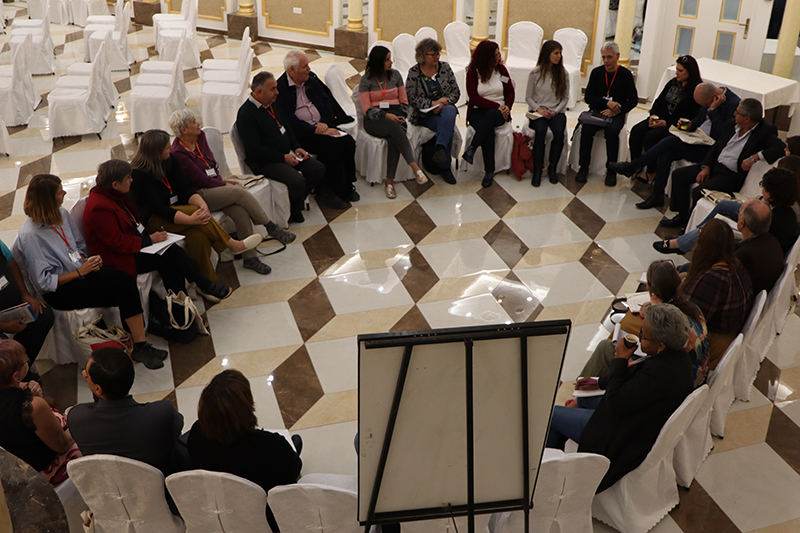
In late 2022, one hundred-eighty persons from around the world and throughout Palestine met during the annual International Kairos Palestine Conference held in Beit Sahour. They have released a conference statement, where they describe a continually grimmer situation for Palestinians. They also call to attention the need for action. The conference statement can be found below.
Statement From The International Conference of Kairos Palestine: “The People, the Church & Resisting the Occupation”
Beit Sahour, November 18 & 19, 2022
We members of Kairos Palestine, the most extensive Palestinian Christian ecumenical movement, and Global Kairos for Justice, the worldwide coalition of concerned Christians from diverse churches and church-related organizations as well as other faiths-based and secular organizations, have gathered in Beit Sahour, Palestine, together with leaders of Palestinian civil society and other international advocates to pray, to discern, to receive and now to share a declaration of sumud (resilience) and hope from the Holy Land.
Reading the Signs of the Times
Our steadfast hope and demand for justice rise up in the face of the following.
- The situation on the ground in Palestine/Israel continues to worsen, as documented in the recent reports of Al Haq, Badeel, B’Tselem, Human Rights Watch, Amnesty International and the UN.’s Special Rapporteur citing Israel’s apartheid laws, policies and practices.
- There is a growing global condemnation of the State of Israel’s apartheid regime, its war crimes and crimes against humanity.
- Israel’s 2018 Nation State Law turned apartheid de facto into apartheid de jure, codifying discrimination against Palestinians in Israel; their strong Palestinian identity.
- The hypocrisy of double standards is increasingly revealed in the international community’s selectively leveling criticism and applying sanctions against countries who break the law and abuse human right conventions.
- In the midst of regional and global economic, social and military crises and environmental degradation, there is a shift in the world’s attention away from the struggles for freedom and the rights of God’s creation in many contexts, working against support for the cause of freedom in Palestine and around the globe.
- Following consecutive Israeli governments, the newly forming Israeli government is poised to further widen existing injustices by welcoming openly racist cabinet members, deepening its settlement enterprise, and changing the face of its justice system, reflecting a global phenomenon.
- Settler violence increases with impunity.
- Palestinian homes and lands are increasingly annexed, forcing displacement of Palestinian families.
- The fifteen-year, devastating blockade and bombardment of Gaza has been normalized and forgotten by the international community; Gazans’ samud continues to inspire us and justice-loving people around the world;
- The international community’s expressions of concern are contradicted by its continued pattern of financial, diplomatic and military support of Israel, making it complicit in the crimes of Israel.
- The heresy of Christian Zionism—one of many theological justifications for and defenses of the policies of Israel—is on the rise in the Christian community. In addition, some churches and ecumenical bodies are enabling the oppression of Palestinians by choosing to remain silent—opting for neutrality, preferring their own convenience over costly solidarity, hiding behind old paradigms of shallow diplomacy and selective interfaith relations. In still other communions, there are official statements accompanied by little action.
- There is division and lack of unity among the political leaders of Palestine.
- Close observers are not surprised by the rage increasingly expressed on the part of the oppressed who—unable to see any movement toward a just resolution—are taking matters into their own hands.
- Additionally, there is a growing despair on the part of many Palestinian young people, citing no vision for peace, no sign of breakthroughs.
- Over the past two years, Heads of Churches and other clergy leaders have spoken with urgency charging that Christian presence in the land is under grave threat.

Our work
Still, we are a people of samud and hope, grounded in the reality of resurrection out of death—in this life as well as the next. Reflecting on our work through Kairos Palestine (KP), Global Kairos for Justice (GKJ), and our growing partnerships with and support from other movements around the world, we remain firm in our pursuit of justice and peace through what is described in the 2009 Kairos Palestine document: the logic of Christ’s love. And we are encouraged by the spirit of grassroots Christians who, together with their Muslim neighbors, are rising up to resist Israel’s growing apartheid.
Together in this Conference, we have celebrated the reports from GKJ churches, church-related and other organizations reflecting a wide and growing diversity of activities working for the goal of a just peace: hosting of webinars and conferences; theological education programs; political lobbying; publishing position papers; collaborating with like-minded secular groups; support of nonviolent actions to call attention to the State of Israel’s apartheid laws, policies and practices; advocating within church structures—all while creatively overcoming the challenges of the COVID pandemic.
We have recognized how Palestinians are more united than ever, claiming their Palestinian identity in every corner of Israel, Gaza and the West Bank (which includes East Jerusalem)—in spite of Israel’s many and varied attempts to divide the people. Nor are Palestinian refugees giving up their right of return, guaranteed under international law.
Global Kairos for Justice issued a ground-breaking report, A Dossier on Israeli Apartheid: A Pressing Call to Churches Around the World to Do Justice: a clear description of apartheid and how Israel’s laws, policies and practices meet the international definition; a Biblical/theological reflection describing the sin of apartheid; a heartfelt call to the global church to hear the pleas of Palestinian Christians; and a list of recommended actions and resources.
We welcome the widespread support of our sisters and brothers from nearly every continent who demonstrated their costly solidarity at this summer’s General Assembly of the World Council of Churches (WCC) meeting in Karlsruhe, Germany. In spite of vocal opposition, delegates passed the World Council of Churches Statement, “Seeking Justice and Peace for All in the Middle East.” The statement calls for WCC member churches and leadership to study and respond appropriately to the recent reports from human rights organizations on Israeli apartheid.
We are especially encouraged by the fact that Global Kairos for Justice has grown in its member organizations. We give thanks for the witness of youth movements and stress the need to continue to mobilize our youth. Recognizing that our work is increasingly linked with other struggles around the world, we participate in mutual solidarity with these oppressed communities in their struggles for human rights and dignity. We form a “unity of the oppressed” in the one struggle for global justice.
In deepening our faith and strengthening our impact we boldly face our own shortcomings. We humbly keep considering ways do things differently.

Our commitment
Today we reaffirm and uphold the Palestinian Christian vision and message first described in the 2009 Kairos document:
We believe in God, good and just. We believe that God’s goodness will finally triumph over the evil of hate and of death that still persist in our land. We will see here “a new land” and “a new human being”, capable of rising up in the spirit to love each one of his or her brothers and sisters. (KP 10)
We embrace a universal calling that came out of this land for the people of the land and the entire world: deepening our understanding and expanding our practice of creative resistance grounded in the radical logic of Christ’s love—an agape that defies human logic, that rests in the mind of Christ and the heart of the God, that insists that all humans beings are created in the image of God, and that sees God’s face even in the enemy. In this way, we declare our continued commitment towards the liberation of both the oppressed and the oppressor.
Our invitation
This Advent and Christmas season, we invite all churches, church-related and ecumenical organizations, people of all faiths and those of good will to join us, and in solidarity:
- Hold us accountable to our commitment to embrace the logic of Christ’s love; walk this path with us as we seek to walk with you in solidarity in your own witness and struggles for justice;
- Respond to the thoroughly documented reports of apartheid, especially Global Kairos for Justice’s A Dossier on Israeli Apartheid;
- Read the calls of Jerusalem’s Heads of Churches regarding increasing attacks on Christians and their churches in the Holy Land;
- Study, further explore and amplify calls of Palestinian Christians: the 2009 Kairos Palestine Moment of Truth; the National Coalition of Christian Organizations in Palestine’s Open Letter (2017); Cry for Hope—A Call to Decisive Action; conference statements; books by Palestinian theologians;
- Join us in sharing experiences and models of resistance;
- Defend Palestinians’ right and duty to resist their oppressors as guaranteed under international law and expressed in the Kairos Palestine’s Moment of Truth;
- Expose the sins of “shrinking space” for truth-telling and creative resistance in Palestine and abroad, and the delegitimization of Palestinian discourse;
- Support civil society, its activists and NGOs, especially those falsely labeled as “terrorist organizations” by the State of Israel;
- Engage in the Palestinian call for Boycott, Divestment and Sanctions (BDS), including calling on churches, denominations and church-related organizations to ensure that their financial investments do not support Israel’s apartheid but rather support Palestinians in their work for justice and peace;
- Engage with and support youth-led initiatives for justice and human rights;
- Find ways in local contexts to partner with like-minded people of other faiths and spiritual communities, and indigenous and human rights organizations sharing in the costly struggle against settler colonialism;
- Explore with us all legal frameworks challenging apartheid and settler colonialism, put pressure on governments to hold Israel accountable, and lobby to end the blockade on Gaza;
- Boldly, prophetically challenge the heresy of Christian Zionism and all other theological justifications and defenses of Israel’s apartheid policies; confront the silence, neutrality and complicities of churches, calling all to take the side of the oppressed for the sake of the oppressor as well as the oppressed;
- Come and see. Go and tell. You will experience the realities that Palestinians suffer daily and, more, your own faith, hope and love will be strengthened by the many signs of God’s presence and power that are evident here.
And now abide faith, hope, love, these three; but the greatest of these is love.
1 Corinthians 13:13
